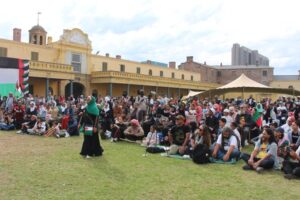The Western Cape Education Department (WCED) is still struggling to place almost 400 Grade 1 and Grade 8 learners who have applied for school since January this year. Last month, Elitsha reported that large numbers of parents were seen in long queues at all of the four education district offices in the Cape Town metropolitan area. Almost 700 late applications were still being processed at the time.
In a statement released on Friday last week, WCED claims to have the issue under control. “We have been hard at work since before schools reopened to find places for learners in the 2024 school year, and to complete our extensive infrastructure programme to create additional places. The massive R716.4-million blow to our overall budget last year came at a time when we needed the funds to build more schools and employ more teachers, as admission demands ramped up,” reads the statement.
The department has also blamed budget cuts for the challenges. “Damaging was the uncertainty created by the collapse of the national budget process, which meant that we could not enter into contracts or start building projects until late last year when the adjustment budget was announced,” says the WCED.
However parents who are confronted with the possibility, of their children missing school this year have a different narrative to share.
Parents decry poor handling of applications
In December she was told
she had to buy a uniform
for her daughter.
In January, her name wasn’t
on the list of learners.
Thembakazi Makeleni, from Delft, says she applied at a local internet cafe to two schools, Sunray or Essenhout primary schools for her daughter, but she didn’t get a place in both schools. “This is painful because when she sees other kids, she cries. I applied for her to start Grade 1 this year, I applied early in April 2023 already. I even got the message, confirming that her application has been received and is being processed sometime last year. Eventually, they also showed me sometime last year that she is on the waiting list at Sunray Primary. I lost my phone, but I kept going to check the status of her application and was told it’s still on the waiting list,” said Makeleni. What was most hurtful, she told Elitsha, was that the school even assured her of a placement in December at a parents meeting and advised her to buy a uniform for her daughter and be ready for school.
“On 15 January 2024, I went to the school again and they said I should come again when schools open on the 17th and my daughter must be in uniform. I bought it and made sure she is ready, and suddenly the teachers said my child doesn’t appear on the list of learners. The school secretary, told me she doesn’t need to peruse all the lists, because the school is already full,” said Makeleni.
Since being disappointed at Sunray, Makeleni has been doing the back and forth to district education offices, and was eventually informed that her daughter will not be admitted to school at all this year. “This is a nightmare, because I borrowed people’s money to buy this uniform, now she will be stuck at home while her peers and siblings are attending school,” she complained.
Thembakazi Makeleni says she was promised a place for her daughter at the Sunray Primary school in Delft. But, after having already bought a uniform, she learned that the school is full and will not accept her child for Grade 1.
Mashudu Mphaphudi said she applied early this year to a school in Delft. She had recently moved to the temporary relocations settlement in Delft South after her shack burnt down. Her daughter was attending school in Belhar. “We lost everything in the fire, and I am not employed anymore. I cannot afford to pay for her transport anymore and don’t know how I will buy her uniform. I have applied for Grade 10, at Masibambisane High School in January, and was hoping that I will be assisted to move my daughter, to a school around here since she is already on the system. I was told that the school cannot accept any more learners this year. So, this means my daughter will not be attending school at all this year,” she said.
Education MEC blames the parents
Western Cape MEC for Education, David Maynier has blamed parents for applying late. “The online application system closed at the end of May 2023. Parents arriving now, 9 months after the deadline for on-time applications, must apply in person at district offices. So the online application system cannot be responsible for parents who are applying extremely late,” Maynier told Elitsha. He said the decision to accept learners was up to the schools and not their system, whether a parent applies online or at district offices. “One of the key challenges we face is a devastating budget cut from the national government, and the collapse of the budget process which created extreme uncertainty and delayed building projects. The national treasury dealt a massive R716.4-million blow to our ability to build and maintain schools, and pay teachers, in November last year,” said Maynier.
Allegations of mismanagement and unequal allocations
In a Daily Maverick article published a week ago, WCED is alleged to have returned an unspent R829-million to the national treasury over the past four years. These funds, according to the article, would go a long way in addressing the incapacities in some schools and to also improve the quality of education in marginalised communities in the Western Cape.
Maynier dismissed the allegations as entirely false. “We have not returned R829-million to the national treasury. We are spending 100% of our infrastructure budget, and we are building classrooms at a faster rate than seen before. We now regularly construct schools in around 70 days as part of our Rapid School Build programme, in poorer communities like Belhar, Wallacedene, Lwandle, Kwanokuthula, Blue Downs, and Philippi,” he told Elitsha. “We are so efficient in our infrastructure spending that the National Treasury allocated an extra R115-million in other provinces’ unspent education infrastructure grant funding to us last year,” he said.
According to Maynier, the Western Cape pays for over half its education infrastructure programme with its own funds, rather than relying on the national government’s conditional grants. “So great is our demand for placement that our province provides 55% of our infrastructure budget from our equitable share funds, compared to Gauteng and KwaZulu-Natal who provide just 8%,” he explained.
Education advocacy organisation, Equal Education (EE) told Elitsha that since the opening of schools last month, several parents and caregivers have approached them with grievances about the difficult application process, difficulties with the appeals process and slow response times from provincial education departments in both Gauteng and the Western Cape.
Researcher at EE, Kimberly Khumalo said, “EE parent members in the Western Cape attended the Open Government First Thursdays event to try and get answers for learners who remained unplaced weeks after the start of the school year. Unfortunately, the premier and MEC Maynier were not in attendance to receive our memorandum of demands. In addition to this, EE members in the Western Cape, with the assistance of the Equal Education Law Centre (EELC), have assisted parents with filling in late application and appeal forms as well as submitting these forms to education department district offices.”
Khumalo said these interventions would not be necessary if the WCED’s admissions process was effective and responsive to the needs of parents and caregivers. “Parents and caregivers should not need to rely on organisations such as EE and the EELC and protests to ensure that their children can access their immediately realisable right to education,” she told Elitsha.
The education department cannot
be shocked at the number
of late applications
According to Khumalo, parents and caregivers who have approached EE have repeatedly highlighted issues with using the online system including that it is inefficient and unclear, inaccessible to those who are not comfortable using technology. She added that the WCED cannot claim to be shocked at the number of late applications every year, given the very short application window in the second quarter of each year. “The reality is that people are offered very limited options to survive and to create better lives for themselves in rural areas. They often have no choice but to migrate to urban areas. The department should be planning proactively for this as they have population growth and migration pattern data at their disposal. Late applications cannot continue to be the WCED’s excuse for denying learners crucial classroom time. The responsibility lies with the department to have a more responsive application process to plan proactively for more learners coming into the province every year,” she explained to Elitsha.





